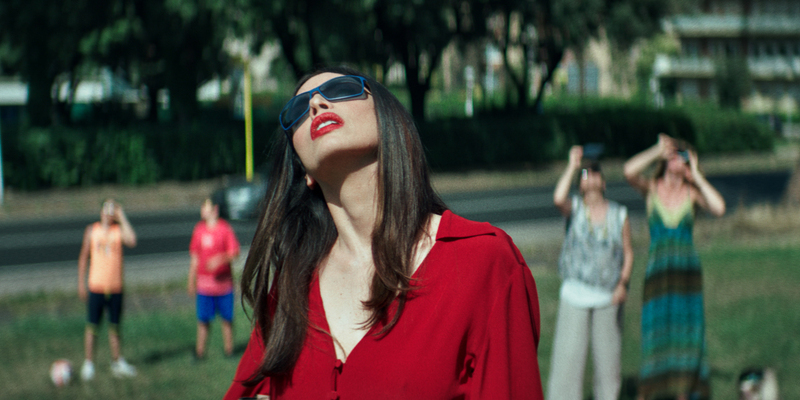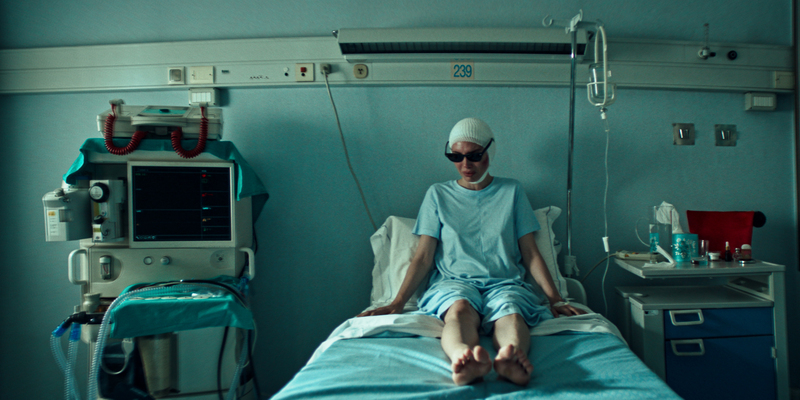
Review by
Eric Hillis
Directed by: Dario Argento
Starring: Ilenia Pastorelli, Xinyu Zhang, Asia Argento, Andrea Gherpelli, Mario Pirrello, Maria Rosaria Russo

I can't think of another great filmmaker who has experienced such a
sharp decline as Dario Argento. You have to go back to 1987's
Opera
for his last great work, and to his 2005 TV movie
Do You Like Hitchcock for his last remotely watchable
effort. In the years since he's given us
Mother of Tears (the almost blasphemously bad follow-up to
Suspiria and Inferno), Giallo (an insult to the sub-genre it takes its title
from) and Dracula 3D (one of the worst adaptations of Bram
Stoker's novel ever filmed), so it's fair to say even his most ardent
fans have written him off by this point.

As such, it was with a heavy heart that I sat down to watch his latest,
Dark Glasses. Pitched as a Rome-set giallo, if ever there was an opportunity for a
return to form, this was it. But, of course, this won’t be a return to
form, will it? Five minutes in, I began to wonder if maybe this was
indeed a return to form. Argento opens his latest with an
Antonioni-esque sequence that's the best thing he's constructed since
Opera. Our heroine, prostitute Diana (Ilenia Pastorelli), is driving
along when she notices people gathered in the streets staring at the sky
through sheets of darkened material. Walking through a park, she
realises it's an eclipse, but she looks at the sun and damages her eyes
before donning a pair of shades. The sequence is filled with an eerie
dread, and it harks back to the sense you get from Antonioni's films
that his protagonists are living in a world of their own, and was likely
conceived as an homage to L'Eclisse.
Oddly, it's not this incident that leaves Diana blinded, but a
subsequent car crash she's involved in as she flees the mysterious
driver of a white van who has been killing sex workers in the city. The
other car involved in the collision contained a Chinese couple and their
young son, Chin (Xinyu Zhang). With his father killed and his
mother in a coma, Chin is sent to an orphanage. Diana is left blinded
and returns home, acquiring a guide dog and a home helper played by
Asia Argento. Through some clumsy storytelling, Diana and Chin
end up living together, with the former carrying on her business with
the kid under her roof and dressing wildly inappropriately in his
company (though the kid's probably not complaining).

The dynamic between Diana and Chin is essentially a half-baked rehash
of that found in his second film,
The Cat o' Nine Tails, in which Karl Malden played a blind man who teams up with his young
niece to solve a series of murders. As goofy as the set-up is, there's a
certain innocent charm to the found family of Diana, Chin and their
faithful hound. It's just as well, because we spend a surprising amount
of time in their company, rather than being treated to the sort of
murder sequences we expect from a giallo.
Despite its Roman setting and its well-worn theme of women being
brutally murdered by an unseen assailant,
Dark Glasses doesn't fit neatly into the classification of
giallo. That label generally implies a whodunit element, but Argento
reveals the killer's identity early on and the film's second half
evolves into a chase thriller. With our heroes fleeing the killer and
leaving the city for the countryside, the film begins to resemble
something closer to Ozploitation than classic Italian thrillers, right
down to an ineptly staged sequence involving an attack by water snakes
that will have viewers laughing unintentionally.

It all leads to an underwhelming climax and an oddly melancholy final
note that I suspect was meant to evoke sympathy but instead plays like a
filmmaker's act of cruelty on a character of his creation. What's most
surprising about Dark Glasses is that the most successful
aspect of the film is its central character dynamic, which despite some
dodgy acting by Pastorelli and Zhang, is quite engaging if hard to
swallow. If you've been watching Argento's films over the last three
decades it's no surprise that the staging of the violence is the film's
weakest aspect, dogged by cheap looking effects and awkward editing. If
you're a diehard Argento fan, you'll watch
Dark Glasses for its dazzling opening, stick around for
the charm of Diana and Chin, but leave with an all too predictable
feeling that the Italian master's best days are well and truly behind
him.


